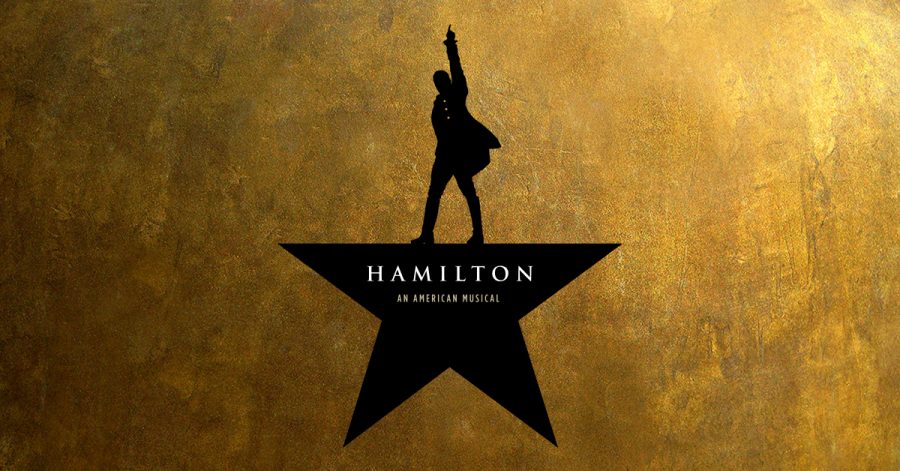REVIEW: Hamilton: the man in the nation, the nation in the man
November 9, 2016
Our lungs burned with bated breath, our hands trembled with expectation, and our hearts danced into a frenzy as the lights dimmed like a cloak of silence coating the theater. The quiet pounded against our bodies; we were zealous, restless, agitated into animation infected with the fever of ardent anticipation. The stage erupted as figures masqueraded in eighteenth-century garb spewed out verses under blazing lights, fueling the energy of young ambitions whilst introducing their immigrant demigod to the colonies he would soon develop into a nation of tremendous economic authority and bureaucratic command.
This, ladies and gentleman, is the story of the first Secretary of Treasury to the United States, George Washington’s right-hand man, engineer of The Federalist Papers, and Framing Father: Alexander Hamilton. In Lin-Manuel Miranda’s brilliant musical, Hamilton, American history is transcended beyond the high school textbook archetype as our Framers are breathed into life. They rap in the style of Biggie, they utter profanities and womanize and drink, they make fools of themselves with sex scandals and admit to a blind hunger for power. And yet, their brilliance and indefatigable endeavors remain steadfast and undeniable.
Miranda’s Hamilton presents an oft-overlooked historical figure to a diametric culture from the one of turn of the nineteenth century. Despite this feat, this production succeeds in flying colors with its exquisite acting and musical numbers, incorporating R&B, hip-hop, jazz, and classical showtune styles. Yet it also manages to manifest parallels between the America of today and that infant country barely standing with wobbly knees under the intent scrutiny of the entire watching world.
The genius of Hamilton resides in its unconventionalism. This is not a musical among the classical protocols of Wicked or Les Miserables or the Lion King. This is a show evoking empathy for men whose job we often take for granted, one where the humor perfectly emulates the essence of American sarcasm, and one that challenges the idea of a stuffy Broadway musical. Miranda invented a novelty that invites automatic criticism: a rap production about Hamilton? And yet its execution is what Lafayette would call “parfait” as it heralds a new era of musical production, where the audacious and avant-garde steal the spotlight, where American ingenuity and initiative is once again rewarded on stage. A revolution is wreaking exultation on Broadway.
This trend of unorthodoxy extends beyond mere style. Hollywood may be whitewashed but Hamilton cultivates diversity within live theatre as much of the cast includes people of color. George Washington (Christopher Jackson), Aaron Burr (Brandon Victor Dixon), Lafayette and Thomas Jefferson (Seth Stewart), and John Laurens (Anthony Ramos), are all people of color. Casting non-caucasians as leaders of the Revolution and as the Framing Fathers is not only challenging the white marble foundation of this country, but redefines the constructs of art that restrict performances. Casts are not required to perfectly mirror characters in their physique. In a country where racial divisions are so painfully conspicuous and inequality so overt, the casting of Hamilton serves to remind us we stem from the same ideal: that of freedom and liberty. The fact that a black man can play Washington or Jefferson, who owned slaves, serves as a testament to the progression of America in its mere 240 years of existence.
In a period where xenophobia strikes fear in droves of American hearts and immigration policy is in dire need of reform, Hamilton reminds us that this nation was born as one of immigrants. Hamilton himself was a scrappy, young migrant from the West Indies who worked and wrote himself into a position of greatness. He was a “bastard, orphan, son of a whore… Dropped in the middle of a forgotten spot in the Caribbean” and managed to climb against all odds into the first president’s cabinet. He fulfilled the illustrious American Dream, that promise of a better life, of greater opportunity, and of the right to life, liberty, and the pursuit of happiness.
Whether poking fun at the Washington establishment’s back-room deals with the number “The Room Where it Happens” or encapsulating American ambition in Aaron Burr’s frustration with Hamilton’s unremitting ascendency to power, Miranda’s Hamilton is infallibly American. This fast-paced, quick-witted production is largely set in America’s darling city of New York where the quintessential Uncle Sam was written, drafted, and executed. This is a story of men who knew history was watching their every move, that the world was anticipating the failure of the American democratic experiment.
And Alexander Hamilton. That brilliant, arrogant intellectual who marched on into the fray when Washington and Jefferson and Burr hesitated. That young and scrappy kid from the West Indies struck down adversaries with his sword and quill, equipped with a mind I wish had a seat in Washington now. We are reminded history is the tale of “who lives, who dies, and who tells [their stories].” Hamilton’s story is a uniquely American one and should be branded and told as the anecdote of a fledgling nation commanded by incredible pioneers of thought and principle. His story, so exceptionally told by Miranda and his cast, courses through the American narrative.










